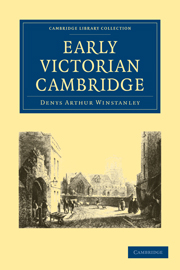Book contents
- Frontmatter
- Contents
- Preface
- Chapter I THE FOUNDATION OF DOWNING COLLEGE
- Chapter II A COLLEGE ELECTION
- Chapter III UNDERGRADUATES IN BONDS
- Chapter IV THE ATTACK ON HEADS OF HOUSES
- Chapter V CHRISTOPHER WORDSWORTH
- Chapter VI THE RELIGIOUS TESTS
- Chapter VII CHANCELLORS AND HIGH STEWARDS
- Chapter VIII TOWN AND GOWN
- Chapter IX TROUBLE AT THE FITZ WILLIAM
- Chapter X INTERNAL REFORM
- Chapter XI THE ROYAL COMMISSION
- Chapter XII BETWEEN THE TWO COMMISSIONS
- Chapter XIII STATUTE XLI AND THE THREE REGIUS PROFESSORSHIPS
- Chapter XIV THE STATUTORY COMMISSION AND THE UNIVERSITY
- Chapter XV THE STATUTORY COMMISSIONERS AND TRINITY COLLEGE
- Chapter XVI CAMBRIDGE AS IT WAS
- Appendices
- Index
Chapter VII - CHANCELLORS AND HIGH STEWARDS
Published online by Cambridge University Press: 07 September 2010
- Frontmatter
- Contents
- Preface
- Chapter I THE FOUNDATION OF DOWNING COLLEGE
- Chapter II A COLLEGE ELECTION
- Chapter III UNDERGRADUATES IN BONDS
- Chapter IV THE ATTACK ON HEADS OF HOUSES
- Chapter V CHRISTOPHER WORDSWORTH
- Chapter VI THE RELIGIOUS TESTS
- Chapter VII CHANCELLORS AND HIGH STEWARDS
- Chapter VIII TOWN AND GOWN
- Chapter IX TROUBLE AT THE FITZ WILLIAM
- Chapter X INTERNAL REFORM
- Chapter XI THE ROYAL COMMISSION
- Chapter XII BETWEEN THE TWO COMMISSIONS
- Chapter XIII STATUTE XLI AND THE THREE REGIUS PROFESSORSHIPS
- Chapter XIV THE STATUTORY COMMISSION AND THE UNIVERSITY
- Chapter XV THE STATUTORY COMMISSIONERS AND TRINITY COLLEGE
- Chapter XVI CAMBRIDGE AS IT WAS
- Appendices
- Index
Summary
A lack of interest in political questions was not a characteristic of the University during the first half of the nineteenth century; and in this respect the contrast between the present and the past is very striking. During the first three decades of the century the Senate petitioned Parliament many times against the relief of Roman Catholics from their statutory disabilities; and on 21 March 1831 approved a petition against the Reform Bill which Lord John Russell had recently introduced. The University had ample precedent for adopting this mode of expressing its political sentiments; but as the petitions which it presented were nearly always in the Tory interest, it inevitably acquired the reputation of being the stronghold of the party which was falling out of favour with the nation. The Burgesses which the University returned to Parliament tell the same story, for a Whig or Liberal can be very rarely found among them.
Political considerations also influenced the choice of a Chancellor and a High Steward. These two officers were not expected to concern themselves with the ordinary routine academic business, and, indeed, could not, as they were invariably absentees; and they were held to have done their duty if they took a benevolent interest in the welfare of the University, occasionally visited it, and, when necessity arose, acted as its spokesman in Parliament. It was therefore thought essential that they should have a seat in one or other House of Parliament, and that when they spoke they should be able to command attention, either on account of their rank or their political distinction.
- Type
- Chapter
- Information
- Early Victorian Cambridge , pp. 97 - 121Publisher: Cambridge University PressPrint publication year: 2009First published in: 1940

